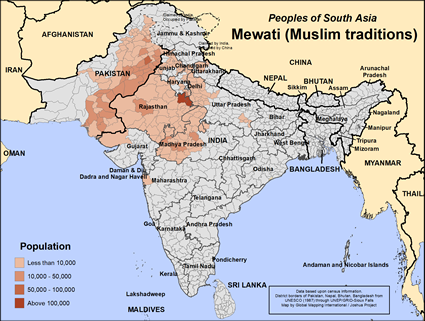Mewati (Muslim traditions) in India

Photo Source:
Anonymous
|

Map Source:
People Group data: Omid. Map geography: UNESCO / GMI. Map Design: Joshua Project.
|
| People Name: | Mewati (Muslim traditions) |
| Country: | India |
| 10/40 Window: | Yes |
| Population: | 836,000 |
| World Population: | 1,855,000 |
| Primary Language: | Hindi |
| Primary Religion: | Islam |
| Christian Adherents: | 0.00 % |
| Evangelicals: | 0.00 % |
| Scripture: | Complete Bible |
| Ministry Resources: | Yes |
| Jesus Film: | Yes |
| Audio Recordings: | Yes |
| People Cluster: | South Asia Muslim - other |
| Affinity Bloc: | South Asian Peoples |
| Progress Level: |
|
Introduction / History
Mewati, also known as "Meo" people are of the Rajput caste. They are Muslims but their former religion was Hinduism. It is believed they turned to Islam in the 1600s and more became Muslims at about the beginning of the 1900s.
They live in the Mewat district of Uttar Pradesh, Haryana and Rajasthan. A larger number of them are in Pakistan.
What Are Their Lives Like?
For a long time Mewati have been livestock farmers, raising cattle. They are well known in India. Some have trucking businesses. Others work for the government, army, or police, electricians, plumbers, money lenders or laborers. Those who live in Haryana do basket work.
While they marry within the group, spouses are selected from other clans or villages. They are not allowed to take a bride from the village of their mother. Marriage is allowed with the widow of the elder brother and with the younger sister of a dead wife. A single spouse is normal, although additional spouses are permitted in cases of infertility. A gift is given for a dowry. Parents arrange marriages and engagement takes place at an early age. The marriage is at the home of the bride and is performed by a Muslim priest. Divorce is allowed and divorcees are allowed to re-marry.
They value education. They eat wheat, rice, maize, fruit, vegetables and dairy products.
Property is inherited only by the sons and the oldest son is head of the home after the death of the father. Mewati have traditional clan assemblies who judge and make decisions. They punish violators with fines or excommunication from the community.
What Are Their Beliefs?
Mewati are considered a Muslim people, although they have had a mixed history of Islam and Hinduism. Attempts to return Mewati people to Hinduism again have failed.
They go on pilgrimages to Muslim shrines and take part in Muslim festivals. They visit and do homage at the tombs of their dead saints. They pray for their wishes to come about by the intercession of these saints. Under the leading of the Tablighi Movement (an Islamic reform movement), they stopped taking part in Hindu festivals and have become devout Muslims. They perform circumcision and bury the dead in their own cemeteries.
What Are Their Needs?
The most important need of Mewati people is to understand that Almighty Creator God has made the provision for them through the only savior, Jesus Christ.
Prayer Points
Pray that Mewati people will see that they need Jesus Christ.
Pray that intercessors worldwide will regularly pray for salvation of Mewati people.
Pray for servants to disciple them.
Pray that many Mewati people who are reached will disciple others until this people group knows that Jesus Christ is Lord.